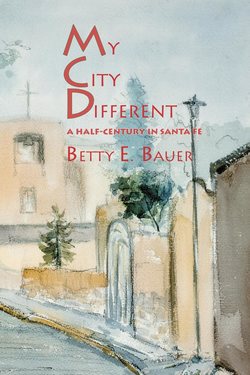Читать книгу My City Different - Betty E. Bauer - Страница 12
На сайте Литреса книга снята с продажи.
5
ОглавлениеIbelieve I met Claude James at a poker party. A bunch of us would get together on Saturday nights and play penny-ante. Claude loved to play cards and someone invited her to join the group. Claude’s father was the Managing Editor of the New York Times. Her mother was a pretty, petite French woman. Claude had been raised in France and spoke French fluently, and English with one of those delightful accents that Americans love. She arrived in Santa Fe wearing a perky little navy blue hat, navy and white dress, blue pumps and white gloves. She was five feet tall and svelte at the time. Her traveling companion and friend was Allison Abott.
When I met her, her figure had blossomed. She wore men’s trousers, a tweed jacket, open-necked white shirt and very dirty oxfords. She had long since forsaken Allison and, although she and Happy Krebs were still partners in The Clip Joint, a successful dog-grooming operation, they no longer lived together. Happy had been married to Peter Krebs and, when Claude moved in with Happy, Peter moved out. Years later, Happy ended up with Allison, and Peter became very friendly with Mike James, Claude’s brother. Santa Fe was like that—musical chairs all around.
Claude decided she was going to have a party and she wanted me to come. It was late April, but still cold and windy; and Santa Feans, bored with winter and hibernating, were ready to party. Claude lived in a fair-size derelict of a house. It was full of dogs, mostly big standard poodles, and she was a lousy—really non-existent-housekeeper. The morning of the party, Claude called me in a panic. “My house—merd everywhere, the dogs you know—You’ll have to have the party at your house!” “But, Claude, I don’t know these people and how many? 16!, you say—my house is tiny—where can I put 16 people?” I wailed—“I can’t do it—You’ll have to find someone else.” Well, she wasn’t about to find someone else—it was going to be at my house period and, furthermore, she’d already called everyone and told them it would be at my house and how to get there. “Don’t worry,” she said, “I’ll bring the food and the liquor.” “But,” I said, “how will I know who these people are if some of them arrive before you get here?” She read me her list and some I knew by sight, although I’d never met any of them—one pair I’d never seen or even heard of. “How will I know those two?” I complained. She replied, “Moya Canning is the most beautiful woman you’ve ever seen and Cecily Cunha is the biggest woman you’ve ever seen. They’ll arrive in a yellow Cadillac.”
There was no mistaking those two even without the yellow Cadillac. Moya Canning was in her mid-fifties, an ex-patriot Brit, about my height, 5′6″, and slender but full-figured. A halo of silvery white hair framed her exquisite patrician features. She was obviously a woman of the world—a commanding presence—a woman used to having it all.
Cecily Cunha was equally stunning. She was part Hawaiian and part Portuguese—tall, a 6 footer, with wide shoulders like a football player encased in his protective padding. Her figure was V-shaped—wide shoulders, narrow waist and slim hips. She had a mop of naturally curly hair and a perpetual suntan. She wore a full-length mink and teetered on spike heels, like an enormous grizzly bear on roller skates. She had been an Olympic swimmer.
Cecily had come to Santa Fe before the war with an escaped white Russian, the Countess Zena DeRossin. She bought Rancho Ancon out in Pojoaque, about 20 miles north of Santa Fe, which she and Zena ran as a sort of dude ranch playground. Parties were frequent and the guests many. Sometimes the party moved on for dinner and dancing at El Nido, a roadside restaurant and bar in Tesuque, a village just north of Santa Fe.
One memorable evening when things were going full tilt at El Nido, Fritzy Bard, another White Russian, a major in the WACS, and Zena DeRossin were talking animatedly in Russian when the FBI descended. Santa Fe was infested with agents during the war and for some years afterward because of Los Alamos. Poor Fritzy almost lost her commission and ended up in the brig over that one, but it was finally all straightened out when the FBI learned it was just innocent chitchat between two ex-patriot Russians who had barely escaped that country with their lives.
El Nido was run by the sure hand of Charlie Besre and the eagle eye of his wife, Mimi. Mimi employed her eagle eye at the cash register and kept the other eye on her husband, Charlie, who was known to have a weakness for les femmes.
El Nido was very popular. The food was exceptional, the bar generous, and it had one of only two dance floors handy to Santa Fe—the other was La Fonda.
